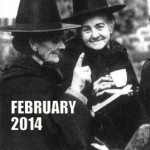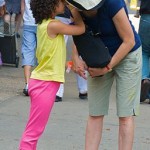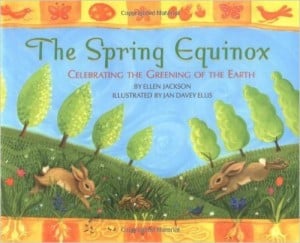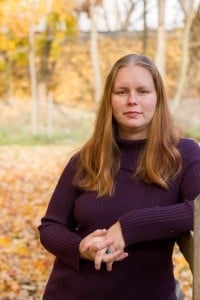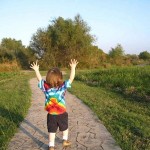
Most of us find Paganism as a teenager or adult, most of us come to the path through a personal epiphany or awakening. Yet for an increasing number of us, Paganism is the ground that we grow in – our community has been around long enough to foster a couple of generations of parents and children and so the numbers of Pagan families rises year on year.
When I say to people that my family is Pagan, and that I was partly raised in a Pagan family, they go all dewy eyed. ‘Lucky you’ they proclaim. But despite the advantages, it’s certainly not an easy path to tread. What marked my upbringing as singular were the activities of our family spirituality and the people we connected with along the way. I remember days building sun wheels with sticks in local parks, of going to the tallest tree in the center of our city on May Morning to tie ribbons and wash our faces in the grass. I remember years of building elaborate Samhain altars, where the names of our beloved dead were intoned. We explored the local flora and fauna, the rich history of our county and the power of the elements at work upon our geography. The values that were esteemed in our home were creativity, honesty, awareness and frugality. These were considered foundational to a kind of embodied Pagan ethics. Everyone, my parents believed, should know how to sing and dance, and they abhorred waste and ugliness, so our family rituals and celebratory life reflected these.
It wasn’t always idyllic though. Across the years, my mum received hate mail from neighbors, frightened we assumed by the amount of bad drumming emanating from our living room, and annoyed by the constant stream of ‘alternative’ people coming in and out of our home. And the dissent didn’t only come from irritated or intolerant neighbors. We had our fair share of run-ins with poseurs and power mongers, and traditionalists who felt that we were diluting the secret solemn nature of Pagan traditions. Our desire to open up the Pagan community meant that we held many open rituals. Subsequently we got really good at developing our instincts, and could spot a true weirdo from a well-meaning Pagan any day!
As kids, we learnt not to judge people by their appearance or their worldly effects. Some of the most profound encounters with the divine that we had (and still discuss amongst ourselves today) were powerful invocations done by friends in the circles we had made. We experienced from a young age, rather than ‘learnt’, that everyone speaks to the spirit of nature and that she in turn speaks with us all.
My parents benchmarks for success weren’t the ‘normal’ ones either. I will never forget when I told my mum that my doctoral topic was going to be contemporary teenage witches. “Really darling?” she asked, “teenagers? Oh dear, how dull…”
Whilst this was liberatory at times it could be a challenge. For example my younger sister struggled with the endless conversations about building a goddess temple or the family’s ongoing creation of a pantheon based on confectionary. I remember a day when she came home and found us all making 6-foot branch woven pentacles. She sighed and quietly went to her room. She often sought refuge at friends who offered suburban sanity. Yet what was important was that whilst there were expectations that we would participate in sabbat celebrations and that our actions would be respectful towards Mother Earth, we were not expected to ‘believe anything’. It was understood that what we thought about the divine was up to us, not something that someone else (even a parent) could tell you.
And then we all got older. Some of us continued to identify as Pagan and some drift in and out. Yet I think all of us would agree today that what being raised a Pagan did was anchor us to the rhythms of the earth’s turning, the language of magic, the power of ritual. The ability to dance, sing and grow green things, which were so highly esteemed in our family continue to reverberate in our life choices today.
Now I have kids of my own and am raising them Pagan I don’t always have to make the map to follow. There is a map my mother made, and I can choose to do it like her or not. And that is a great gift. And whether or not my kids choose Paganism as adults, I choose to raise my kids Pagan because it gave my siblings and I a strong creative, ethical foundation. Why wouldn’t I want to share it? My siblings and I are no ‘better’ Pagans than anyone who has dedicated themselves to the path today. However, being raised in a Pagan family means that I have experienced how we are the orchestrators of our destiny, and how being different builds fortitude. It has shown me how to create community and find good people and I know that if I can dream it, I can live it. I hope that our celebrations of Earth, Sun and Moon root my kids’ to something more than the history of our family, and gives them hope for our collective future.
——————————————-
Hannah Johnston PhD is the Child and Family Liaison Officer for PF Beds Bucks and Herts. She is an educator, folk singer and author of the forthcoming Children of the Green: Raising Our Kids in Pagan Traditions (Moon Books).


